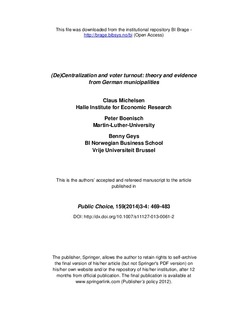| dc.contributor.author | Michelsen, Claus | |
| dc.contributor.author | Boenisch, Peter | |
| dc.contributor.author | Geys, Benny | |
| dc.date.accessioned | 2014-06-10T11:56:42Z | |
| dc.date.available | 2014-06-10T11:56:42Z | |
| dc.date.issued | 2014 | |
| dc.identifier.citation | Public Choice, 159(2014)3-4: 469-483 | nb_NO |
| dc.identifier.issn | 1573-7101 | |
| dc.identifier.uri | http://hdl.handle.net/11250/196286 | |
| dc.description | This is the authors’ accepted and refereed manuscript to the article. Publisher's version is available at link.springer.com/ | nb_NO |
| dc.description.abstract | A vast academic literature illustrates that voter turnout is affected by the institutional design of elections (e.g., compulsory voting, electoral system, postal or Sunday voting). In this article, we exploit a simple Downsian theoretical framework to argue that the institutional framework of public good provision – and, in particular, the distribution of political and administrative competences across government levels – likewise affects voters’ turnout decisions by influencing the expected net benefit of voting. Empirically, we exploit the institutional variation across German municipalities to test this proposition, and find supportive evidence. | nb_NO |
| dc.language.iso | eng | nb_NO |
| dc.publisher | Springer | nb_NO |
| dc.subject | Voter turnout | nb_NO |
| dc.subject | Institutions | nb_NO |
| dc.subject | Federalism | nb_NO |
| dc.subject | Paradox of voting | nb_NO |
| dc.title | (De)Centralization and voter turnout: theory and evidence from German municipalities | nb_NO |
| dc.type | Journal article | nb_NO |
| dc.type | Peer reviewed | nb_NO |
| dc.source.pagenumber | 469-483 | nb_NO |
| dc.source.volume | 159 | nb_NO |
| dc.source.journal | Public Choice | nb_NO |
| dc.source.issue | 3-4 | nb_NO |
| dc.identifier.doi | 10.1007/s11127-013-0061-2 | |
| dc.description.localcode | 2, Forfatterversjon | nb_NO |
